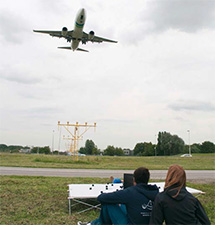Profile Sustainable Air Transport
In operating airlines and airports, a large number of (competing) requirements are encountered. These comprise minimizing environmental effects (noise, air quality and climate effects) and costs, and maximizing resilience and, of course, safety.
To deal with all requirements two elements are important. First, you need to be able to quantify all these so-called Key Performance Indicators (value, environmental impact, cost, capacity, efficiency and safety). You will learn to deal with questions like ‘How can we define how efficient operations are?’ or ‘What is the contribution of aviation to greenhouse gasses in the atmosphere?’. Simulations, using appropriate modelling techniques, are an essential element in this. Three SAT profile core courses aim to provide you with the relevant theories. The SAT profile course ‘Agent‐based modelling and simulation in Air Transport’ introduces you to the important and widely used concept of agent-based modelling of complex distributed dynamic systems. Through the course ‘Aircraft Emissions and Climate Effects’ you will be able to quantify the effects of aviation on the atmosphere, both near-the airport and globally (climate effects). Finally, the ‘Stochastic Processes and Simulation’ course brings in the concept of randomness, accounting for the unpredictability of daily life.
The second element draws on this ability to quantify the Performance Indicators, and aims to actually optimize airline and airport operations given the requirements agreed upon by the relevant stakeholders. The SAT profile course ‘Airline Planning & Optimization’ expands upon the track course on operations optimization, now putting a special focus on airlines. Transfer of the developed tools and insights to daily life should be realized, for example through the use of decision support systems or monitoring strategies.
The increasing availability of (big) data, ranging from airline network data and aircraft maintenance monitoring to noise and pollution measurements near airports, together with innovative AI and machine learning methods provide new insights and opportunities in the field of air transportation. Both modelling and such data-driven approaches are covered throughout the courses in this profile. Although all courses apply theories to the case of aircraft, airports and airlines, the theories are general and transferable to other fields.
The SAT profile learning objectives are:
- Understanding of the key operational challenges faced now and in the future by airlines and airports.
- Understanding the theories needed to quantify the performance indicators related to the operation of airports and airlines (environmental impact, cost, capacity, efficiency and safety).
- Apply these theories for modelling, measurements, and analysis in applications related to the operation of existing and future air transport systems.
- Developing the ability to transfer the methods to society both through technological advancements (decision support systems) and communication.
For the course descriptions see the digital study guide.
Contact

A document that provide basic tips on the installation of the suggested software and most important packages that will be used during the MSc courses is provided here.